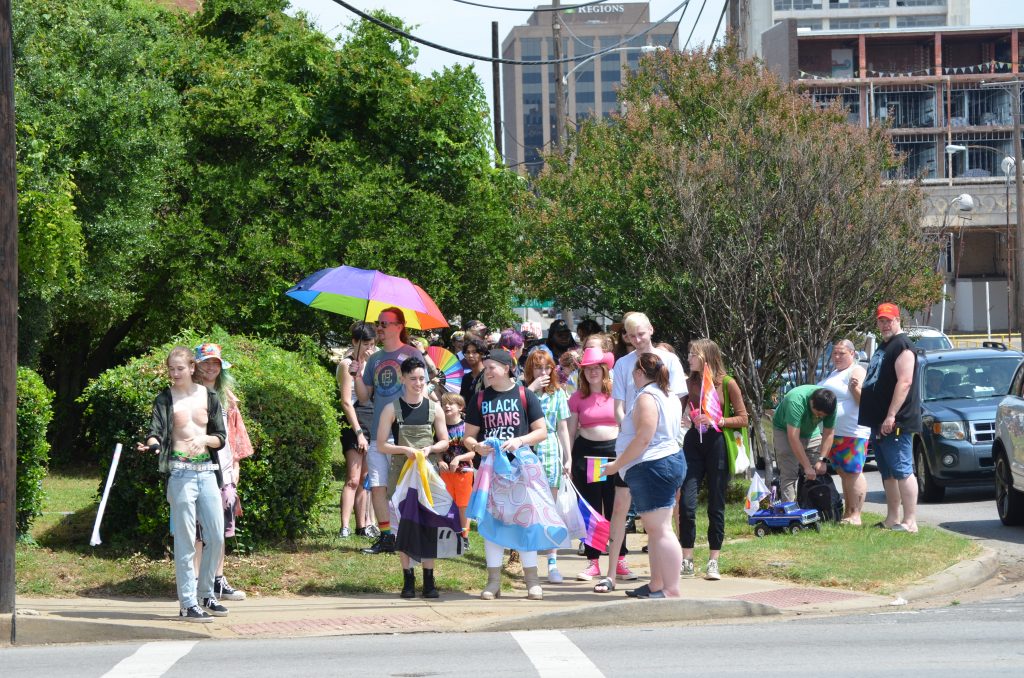
Pride participants march and chant along South Broadway Ave. at Tyler’s third pride march June 4. 📷 Nico Grayson
Tyler’s third annual pride march took place June 4th, drawing queer Texans and their allies to the long-awaited celebration. Participants shopped from local vendors and marched downtown advocating for queer visibility and LGBTQ+ rights.
March participants told what it means to them to be queer and what they wish people knew about them.
Xoe, a participant, defined queerness as “not fitting in any of the predefined boxes that have been around for ages,” knowing that, although they have very real consequences, concepts such as gender, sexuality and race are human constructs.
“As an immigrant and a trans woman, it’s hard to say where I fit in, because it just feels like I’m already in several marginalized groups,” Xoe said.
Xoe said queer people should not be seen in a negative light because of their perceived differences.
“We’re just people trying to live our lives and be happy,” she said.
Similarly, Meghan, a LGBTQ activist, said being queer means having the chance to be her true self as a bisexual woman. However, her journey of queerness was filled with many challenges as she overcame resistance within herself and from her peers at church.
“I had a lot of internalized homophobia. It took a lot of therapy, a lot of working through and processing these things. And I think it affects a lot of us, especially out here in East Texas where it’s not as common. For a lot of families, when somebody comes out, they’ll disown their child just because of their religion or personal beliefs.”
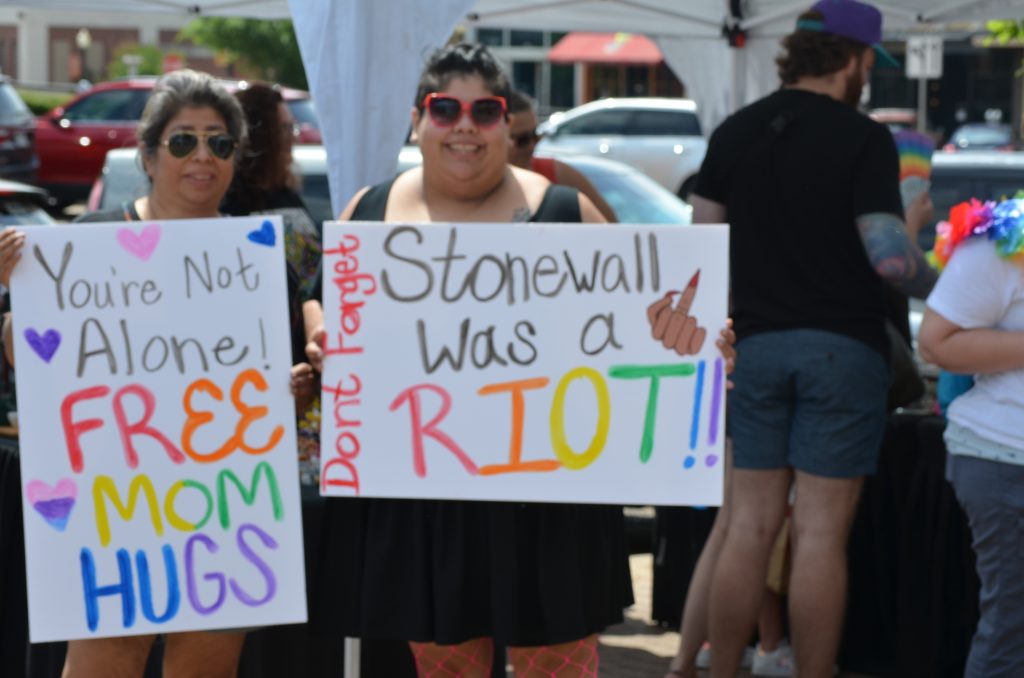
Meghan and her mother sport signs at Tyler’s third pride march last Sunday. 📷 Nico Grayson
For Meghan, Pride is an important celebration because of its revolutionary origins at the Stonewall Riots. Also called the Stonewall Uprising, which began June 28, 1969, New York City police raided the Stonewall Inn, a gay club located in Greenwich Village, New York City.
“The thing for me is that historically, riots are how we get stuff done. It’s just to remember that it wasn’t always peaceful marches. We had people that were beat up and thrown down. Pride started with a trans woman of color and we have to hold true to our roots in that,” Meghan said.
When asked about the role women of color play in the liberation of queer people, Meghan explained how primarily black lesbian and transgender activists led the gay liberation movement of the late 1960s and 70s. Trans activists Marsha P. Johnson and Major Griffin-Gracy and biracial lesbian Stormé DeLarverie are some examples of these revolutionary activists.
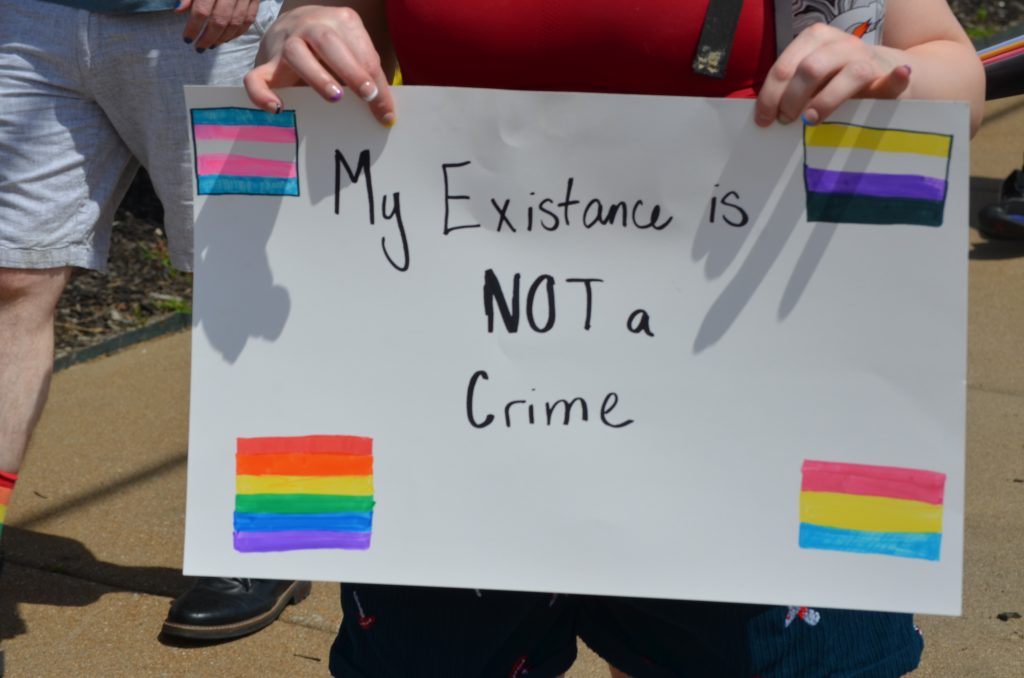
A Tyler pride protester holds up their sign while marching. 📷 Nico Grayson
“It isn’t until things start happening to white women that things come to light,” Meghan said. “Have you ever seen The Handmaid’s Tale? That story has been real life in slavery times and happened to women of color for years. So, I just feel like we need a lot more queer people of color’s voices in the community to have that representation.”
The march was a celebration of just that: the uplifting of marginalized voices throughout the East Texas community. Tyler’s march along Broadway Avenue to Front Street wasn’t the only way the queer community made waves. Through an array of different art forms, people protested peacefully. For example, the indie folk musicians Gypsum and the Travelers played a vibrant set s as a backdrop for the celebration.
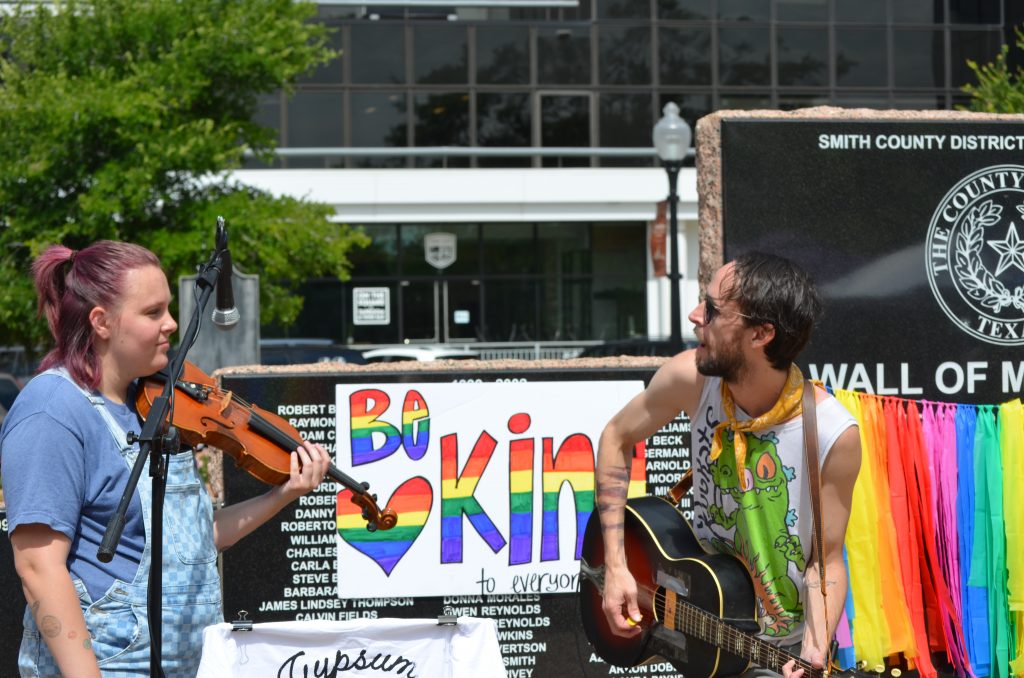
Tyler’s indie-folk Gypsum and the Travelers performed at the third annual pride march. 📷 Nico Grayson
In addition to music, drag performer Eyza Savant vogued and danced on the square to an enthusiastic crowd. When asked about what drag meant to them, Savant said, “I answer that question the same way every time: it is a political statement. This is because we’re not what is considered normal in society, so I use my art as a political statement in order to use my voice as a platform.”
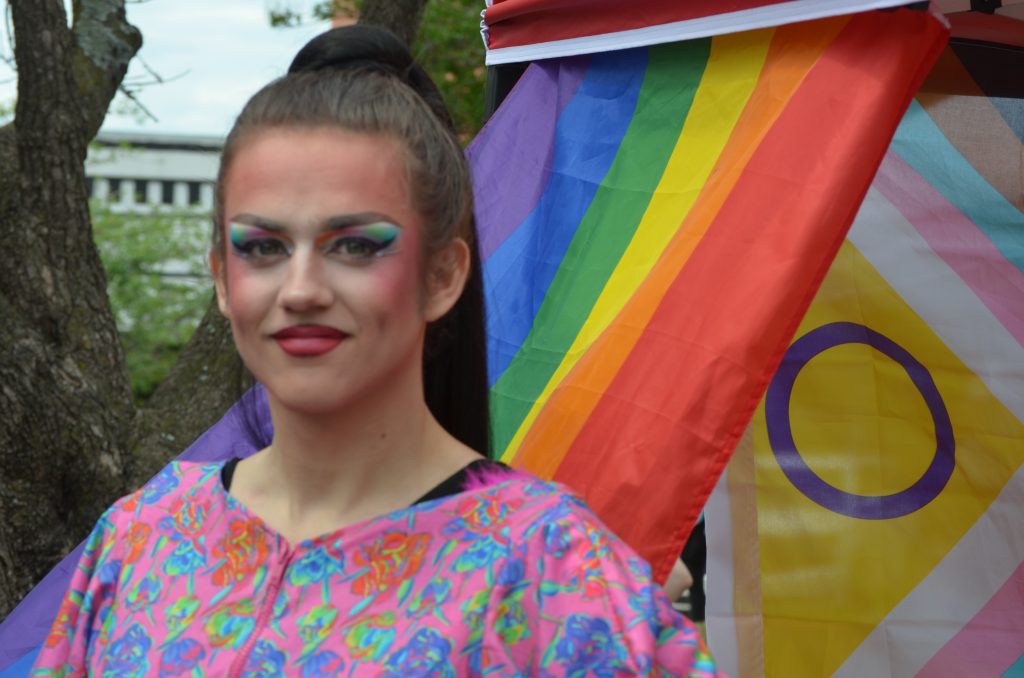
Drag performer Eyza Savant said they use dance as a political statement. 📷 Nico Grayson
Other artists showcased their talents, primarily as crafters among the booths scattered along the square. From homemade art and jewelry to crocheted pieces, the market overflowed with items celebrating queer joy. Artist Harmon Mcclellan, unpacked how his jewelry and t-shirts help customers wear a little piece of liberation with them wherever they go.
Harmon said, “My ‘trans is sacred’ shirts are inspired by an indirect opposition to the religious idea of what is sacred: the common belief that many religious people have about trans and queer people. It’s really all about reclaiming the idea that trans people can be sacred and holy and divine,” he said.
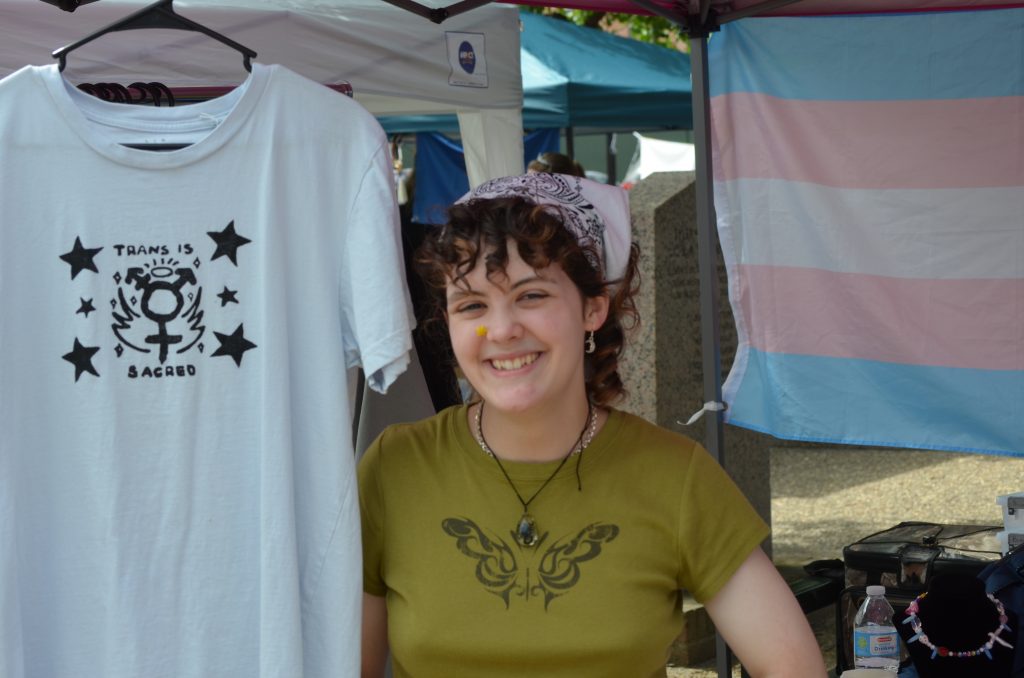
Harmon Mcclellan said he wants to reclaim that trans people can be sacred. 📷 Nico Grayson
As trans rights have become a prevalent issue within legislation in the south within recent months, many trans activists such as Mcclellan hope to shine a light on what it means to walk in their shoes.
“I think there’s still just so much misunderstanding about what being trans actually means. And I think people tend to make a lot more assumptions when it comes to gender rather than sexuality. Not that people don’t make assumptions about sexuality, but I feel like gender is something where people try to put firmer labels on others.”
In addition to visual arts, Synnamon, from the group Diva Dance, said dance is an artistic form expressing her queerness.
“We’re all about confidence and community, and it’s really just for anybody of all shapes and sizes to come together and feel free,” she said.
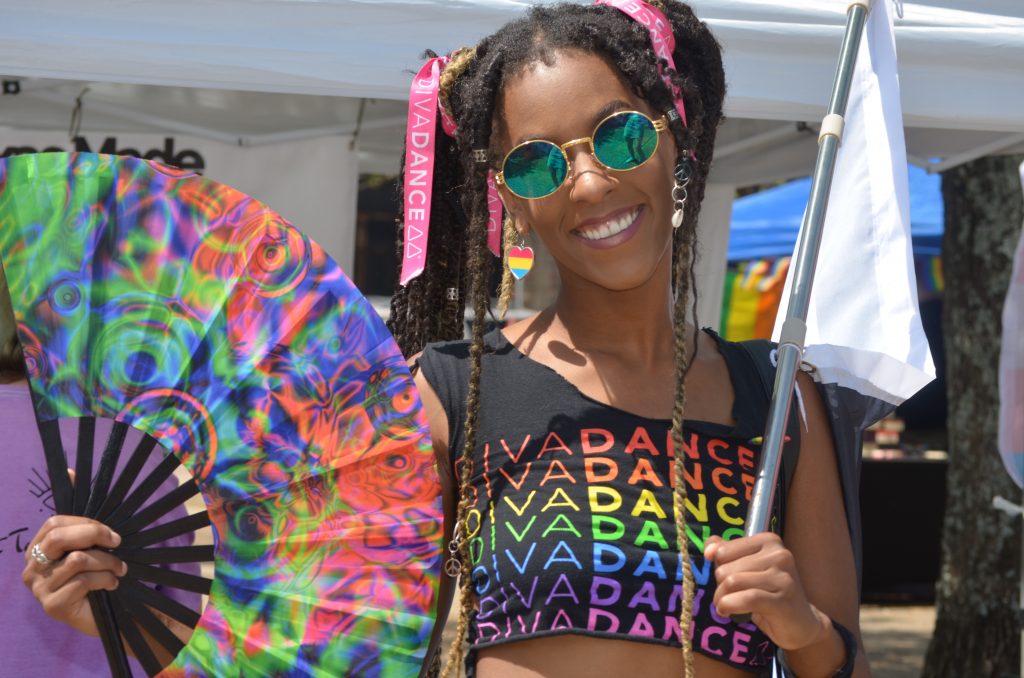
Synnamon, with the group Diva Dance, said she is happy to answer questions for people who want to learn about queerness. 📷 Nico Grayson
Because the world of queerness is diverse, advocates like Synnamon want people to know having questions can be celebrated.
“If y’all want to know more, just ask a fellow ally or a fellow queer person who’s willing to educate and teach anyone who wants to learn in new ways. Whoever has questions, just kindly ask and we’ll be happy to answer.”
Some pride march participants answered the question, Who do you wish were here today marching with you?
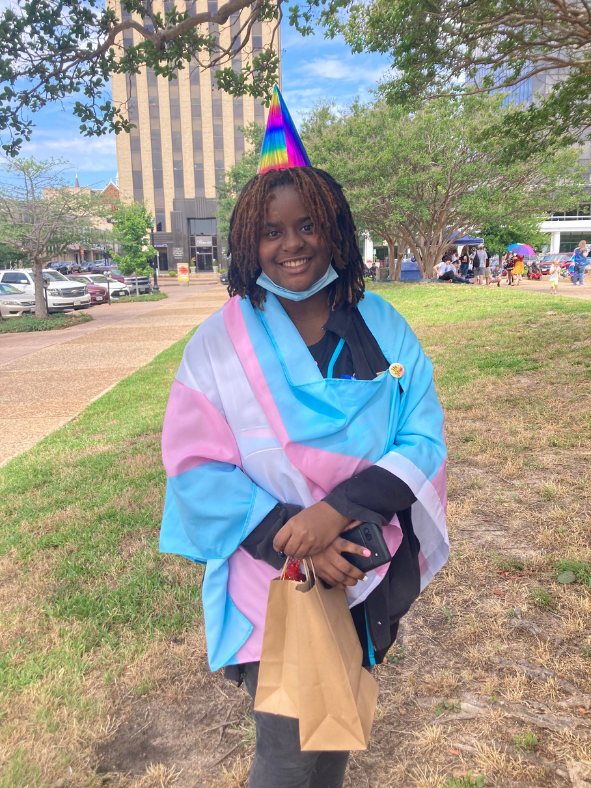
Lin Davis said they wishes their their dad were at the march to help see Lin in a new light. 📷 Jane Neal
“I would say my dad,” Lin Davis said.
“He’s not the best with all of this, and I wish I could talk to him and tell him how I feel and who I actually am. He’s just under the impression of me being one thing: the same thing I’ve been since I was a child, and obviously I’m not.”
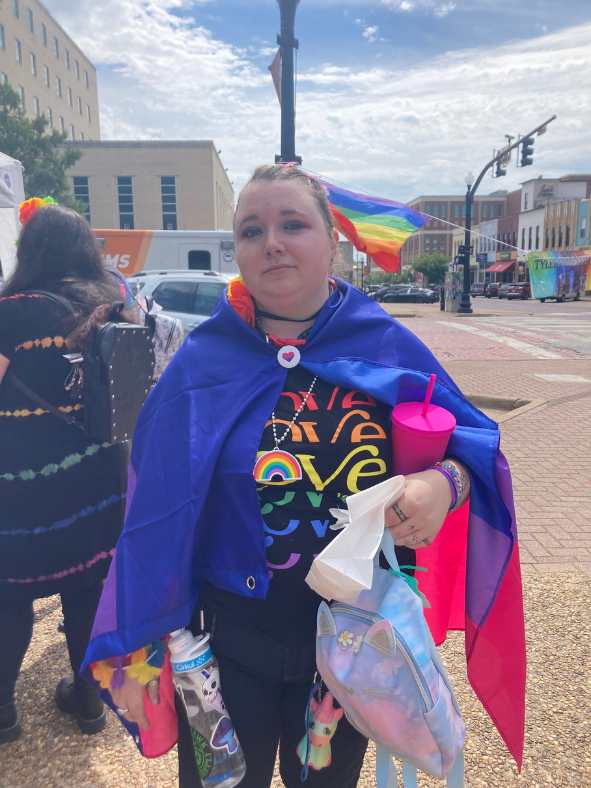
Kristen Taylor said his parents kicked out her brother when he came out as a teen. 📷 Jane Neal
Kristen Taylor, a marcher sporting the bisexual flag, said, “My little brother John – I don’t know where he is. His parents kicked him out. He came out as gay and his parents told him to go to hell. He was 18 when he came out and he would be 22 this year,” Taylor said.
“Kids don’t choose to come into this world. We bring them into this world, and it’s our job to love ’em no matter what the hell they come out to be.”
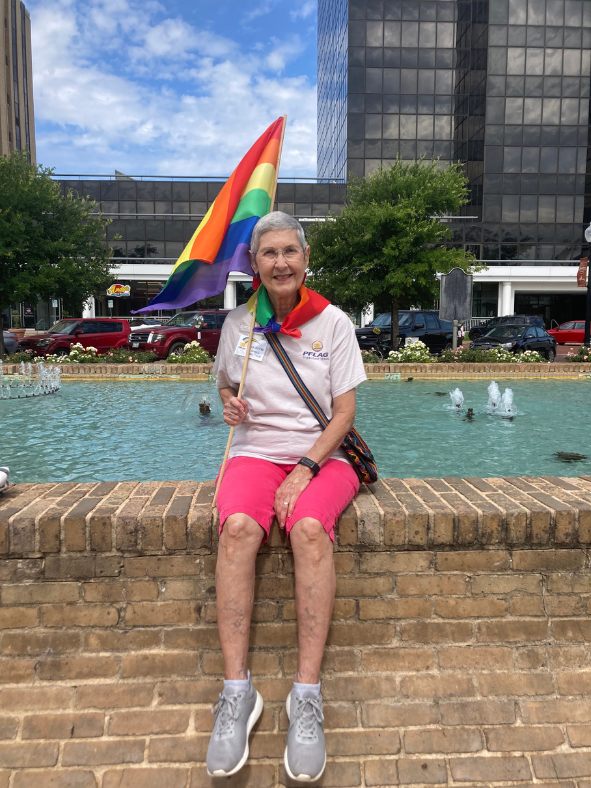
Lou Anne Smoot of Tyler PFLAG said she wishes church and city leaders were more supportive of young gay people. 📷 Jane Neal
Lou Anne Smoot, a gay woman and leader in Tyler’s LGBTQ+ advocacy group PFLAG, said, “I wish some of these Baptist leaders would take time to learn more about the gay community. These are so many young people that are just coming out, and they need support. I wish they had a better opportunity to get support in this area.”
She expressed her frustration with local leadership.
“My thoughts now go to the fact that we can’t even put up a pride flag display in the public library. This is ridiculous that our city leaders succumb to the pressure of those that exert their prejudice.”
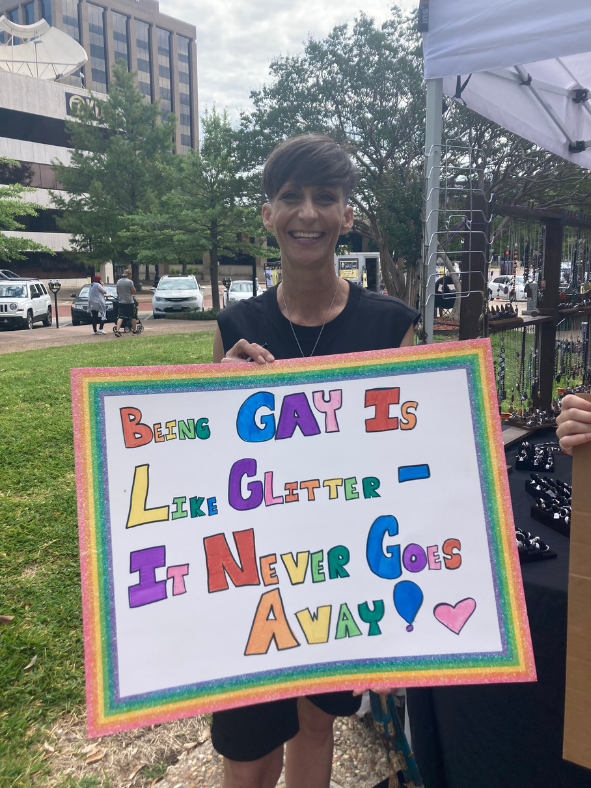
Erica Osborne said there are “bigger problems in this country,” like homelessness. 📷 Jane Neal
Erica Osborne, who donned a glitter poster said, “I wish everyone who had an issue with just people having rights to be people were here. If you’ve got a problem with somebody wearing makeup and color in their hair, we’ve got so many bigger problems in this country.”
Erica said queer youth are statistically much more likely to experience homelessness.
“We have homeless people, we have starving people. We have children in foster care that need homes, and we have people out here protesting this. We have so many bigger problems. Love is love. Everybody should love one another, and that’s why we’re here.”
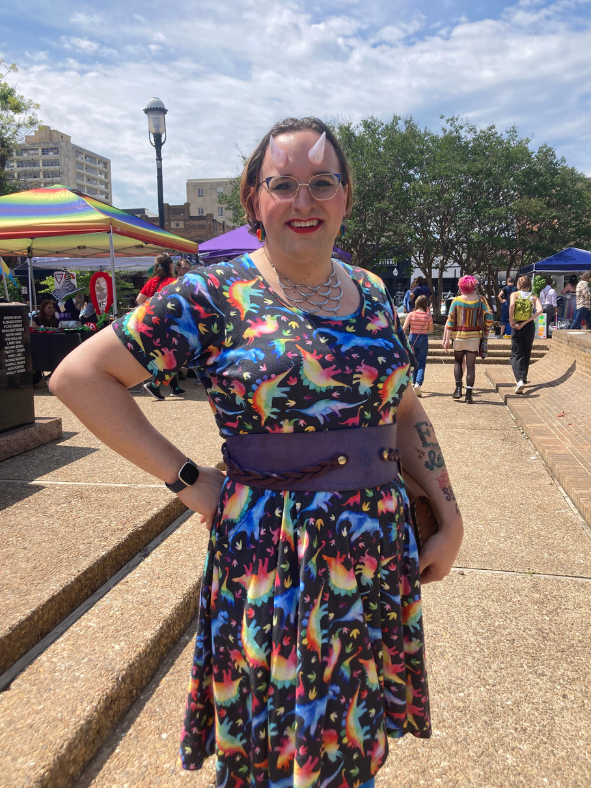
River Evers said health care for trans people is hard to access, and this is something our state leadership could change.📷 Jane Neal
River Evers, who runs a pride event in Longview, Texas, said, “I wish the governor and people in leadership were involved. I wish they knew that drag is an art form and an expression of pride in oneself. Also, that health care is really hard to get for trans people, even for people like me with a government job.”
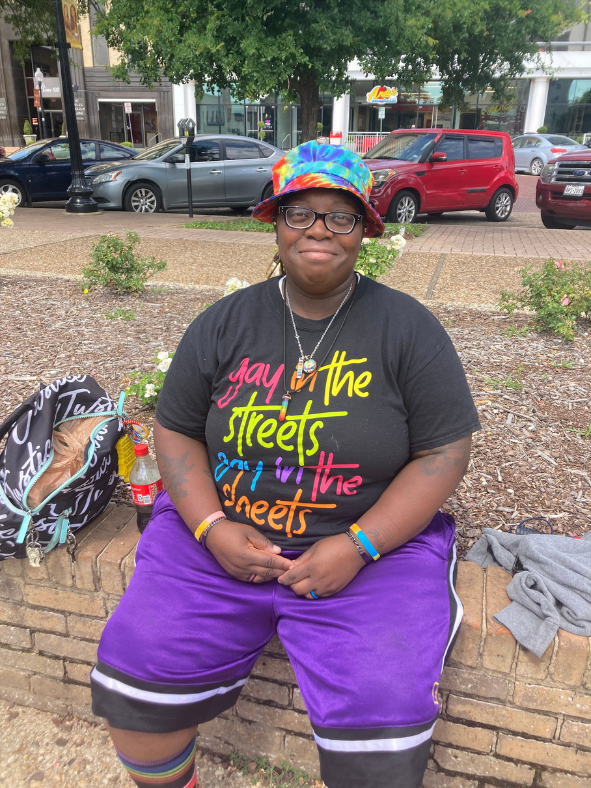
Dakota Blanton said having her mother’s acceptance and support helped her come out. 📷 Jane Neal
Dakota Blanton, an openly queer woman added, “I wish the ones that don’t know themselves were here; the ones that are scared to come out.”
There are ways for reluctant queer people to learn more about themselves and find community. Through the Transgender Equality Network East Texas, East Texans can find support from their fellow queer peers.
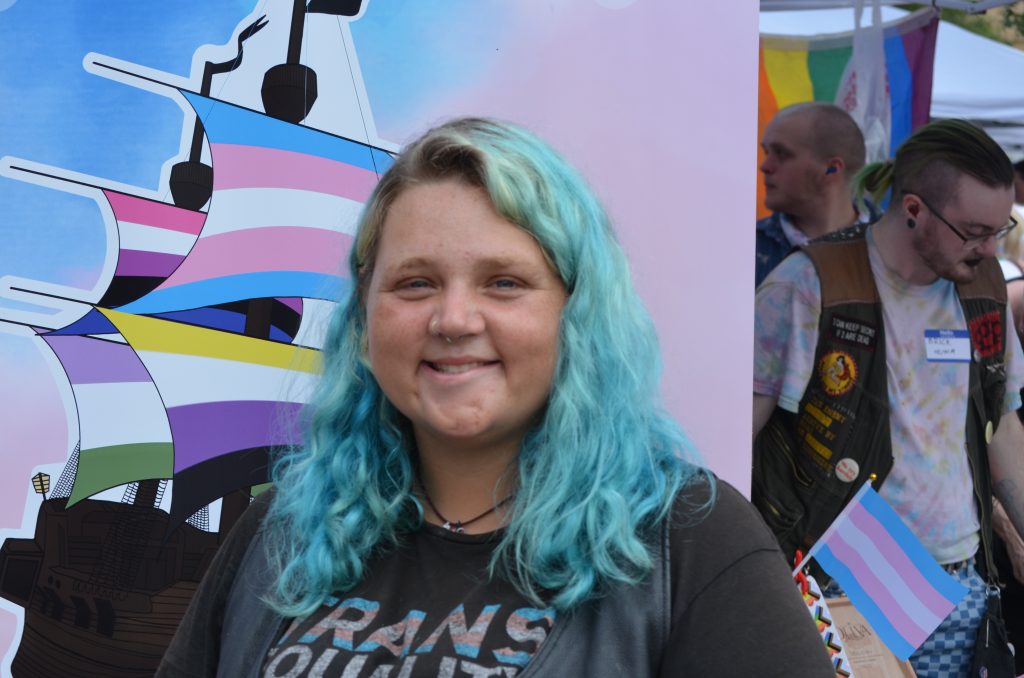
Bean Castañeda of Transgender Equality Network of East Texas said they wish their mom had attended the pride march. 📷 Nico Grayson
Bean Castañeda, president of the network, said, “I wish my mom was here, but she’s never gonna come to any of these kinds of things. If people were more supportive, there would be less death rates, less suicide rates, just more happy people in general.”
They also shed light on what the Transgender Equality Network of East Texas does for its community.
“We are a nonprofit aimed at helping non-binary and transgender people survive. We have an HRT team fund where if you are running low on money and can’t afford your HRT for a month or so, we can spot you for that,” Castañeda said.
“We also just offer general companionship if you’re in a world where nobody supports you.”
Nico Grayson (they/them) were born and raised in Tyler, Texas and graduated as salutatorian of the first graduating class of Early College High School where they obtained an associates degree in Business Administration from Tyler Junior College. They graduated from The University of Texas at Austin with degrees in communication & leadership and in international Relations & global studies. Nico has worked in sectors they are passionate about, including equitable housing, education accessibility, mental health advocacy and LGBTQ+ rights. Their favorite hobby is writing songs and producing music.
Love what you're seeing in our posts? Help power our local, nonprofit journalism platform — from in-depth reads, to freelance training, to COVID Stories videos, to intimate portraits of East Texans through storytelling.
Our readers have told us they want to better understand this place we all call home, from Tyler's north-south divide to our city's changing demographics. What systemic issues need attention? What are are greatest concerns and hopes? What matters most to Tylerites and East Texans?
Help us create more informed, more connected, more engaged Tyler. Help us continue providing no paywall, free access posts. Become a member today. Your $15/month contribution drives our work.







